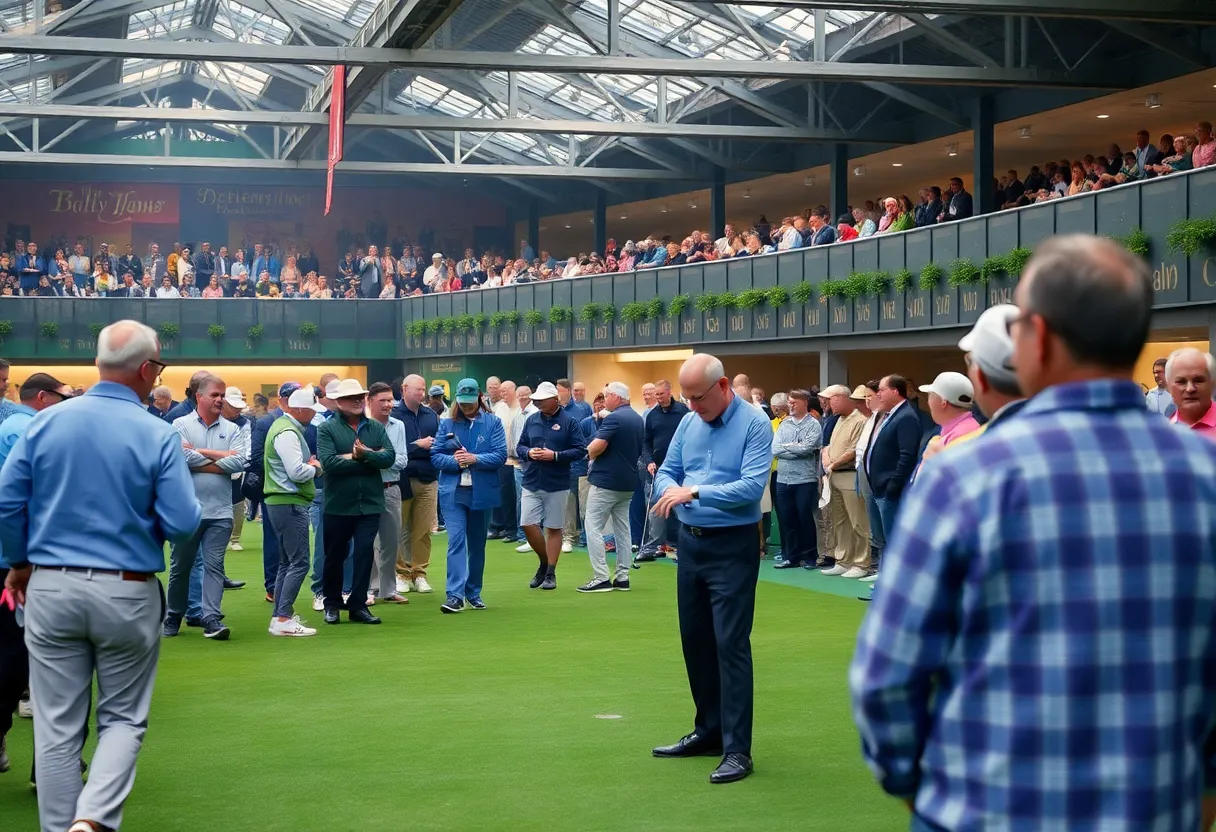, August 22, 2025
News Summary
At an exhibition match in Birmingham celebrating the 40th anniversary of Europe’s first Ryder Cup victory, Nick Faldo criticized the domination of the U.S. in men’s professional golf’s global schedule. With a new PGA Tour competition committee announced, concerns rise over the U.S. focus potentially undermining European circuits, risking the continent’s best venues becoming mere stepping stones. The need for a more globally inclusive tour is emphasized as the sport grapples with commercial pressures amid shifting dynamics.
Birmingham: Faldo Lashes Out as Golf’s Global Calendar Remains Stuck in the U.S.
The Belfry buzzed like an old rivalry rediscovered as veterans stepped onto the tee for an exhibition match marking the 40th anniversary of Europe’s breakthrough Ryder Cup victory. It was nostalgia and pageantry, but off the green the conversation was anything but sentimental. A leading British figure in the game used the moment to lay into what he sees as a persistent problem: the top level of men’s professional golf still runs on an almost exclusively American timetable.
Big names, bigger questions
The week brought fresh movement at the PGA Tour with the arrival of a new chief who has vowed to deliver substantial change. One of the headline moves was the creation of a nine-person competition committee, put together to shake up formats and rethink how elite events look and play. The committee is fronted by one of the sport’s most recognisable figures, but it does not include any European representation — a notable point given the existing alliance with the DP World Tour.
Tour leadership has said the partnership with Europe will be part of discussions about a new competitive model, but that assurance hasn’t eased the frustration voiced by many observers. The new committee comes at the same time as the Tour announced an elevated Signature Event at Donald Trump’s Doral in Miami, taking the tally of high-profile U.S.-based tournaments up to nine. That pattern — big money, big events, and a home-field focus in America — is what critics say is strangling any genuine global calendar.
Why the row matters
Frustration is layered. There was the storm of disruption when a rival circuit arrived in 2022 and shook the market, and many hoped the fallout would push the sport toward a more worldwide approach. Instead, the momentum appears to have reinforced U.S. dominance, with major new investment and guaranteed-player models concentrated stateside. For some in Europe, the concern is that this turns the European circuit into a feeder system rather than a rival, siphoning talent and leaving historic venues and tournaments searching for relevance and the star power sponsors demand.
One veteran suggested a different path: a genuinely global tour where the best players from everywhere chase one calendar, rotate through top courses across the UK, Europe, Asia and beyond, and compete for big prize pools without the messy business of appearance fees. That idea aligns with a leading player’s long-standing vision for a world tour, and it’s gaining fresh traction as the sport’s stakeholders try to balance tradition, money and global appeal.
Practical problems for European golf
Right now, organisers of important European events are hustling for sponsorship and player commitments. The Betfred British Masters at the Belfry is a prime example: it has direct bearing on Ryder Cup selection and offers routeways for players targeting a PGA Tour card the following year. Yet securing backers means delivering headline names, and the reality is that lucrative American sponsorship deals — commonly quoted in the $20–25 million range for major U.S. events — come with hard demands on guarantees and field quality.
That commercial logic is pushing European promoters into a corner. Some are in talks with fresh sponsors to keep domestic tournaments viable; others worry that the continent’s best venues will increasingly host secondary events while the top-tier calendar remains U.S.-centric.
Where things might go next
Expect more debate, louder calls for a genuinely global schedule, and political wrangling behind the scenes. The new tournament formats under consideration could bring variety and drama, and the idea of a world tour that gathers the elite on a rotating, cross-border circuit is being pushed more openly than it was a few years ago. But the road from talk to reality runs through money, broadcast deals and the willingness of national and regional tours to cede control.
For fans, the core question is simple: do they want to see the best players meet more often in great courses around the globe, or will commercial muscle and established U.S. footholds keep the big events close to home? The answer will determine where the sport heads next and whether historic tournaments in Europe remain stages for greatness or stepping stones to something elsewhere.
FAQ
Why was there an exhibition match at the Belfry?
The match marked the 40th anniversary of Europe’s first Ryder Cup victory over the United States, bringing together former stars to commemorate that milestone and remind fans of the competition’s history.
What are the changes the PGA Tour is proposing?
New leadership has launched a competition committee to review formats and explore changes to elite events. The Tour has also added a Signature Event in Miami, raising the number of elevated U.S.-based tournaments.
Why are people calling for a world tour?
Critics argue that scheduling and prize-money concentration in the U.S. limit opportunities for global competition. A world tour would aim to gather top players from all regions into a single calendar and spread major events across leading venues worldwide.
Is European golf at risk of becoming a feeder circuit?
There are concerns that Europe is losing its best talent to the U.S.-centric calendar, making it harder for European events to keep star power and sponsorship, which could weaken the circuit’s standing.
How much do big American sponsors typically invest?
Major sponsorships for high-profile U.S. events are often reported in the tens of millions, commonly around the $20–25 million mark, and these investments tend to demand strong guarantees on player participation and event quality.
Quick reference table
| Item | Details |
|---|---|
| Event highlighted | Belfry exhibition marking the 40th Ryder Cup anniversary |
| Key development at PGA Tour | New competition committee (9 members), new Signature Event in Miami at Doral |
| European concern | Risk of becoming a feeder tour as top players move to U.S.-based schedule |
| Event with qualification importance | Betfred British Masters at the Belfry — key for Ryder Cup and PGA Tour qualification routes |
| Typical U.S. sponsorship scale | $20–25 million for top-tier events, with heavy demands on player guarantees |
Deeper Dive: News & Info About This Topic
HERE Resources
LPGA Tour 2025 Schedule Unveiled with Record Prize Money
Boston Welcomes the Return of Women’s Professional Golf
Boston Hosts Diverse Weekend of Community Events
Doral Roars Back and PGA Tour Schedule Gets a Shake-Up
FM Global Championship Returns to TPC Boston
Leo J. Martin Golf Course Ranked Worst in the U.S.
Girona Confirmed as Host for the Ryder Cup
Greater Boston’s Thriving Dining Scene Welcomes New Restaurants
Additional Resources
- BBC Sport: Faldo Lashes Out as Golf’s Global Calendar Remains Stuck in the U.S.
- Ryder Cup: Enterprise Mobility Named Worldwide Supplier
- Global Golf Post: Is Ryder Cup Reed Worth the Trouble?
- Wikipedia: Ryder Cup
- Google Search: Ryder Cup news
Author: STAFF HERE BOSTON WRITER
The BOSTON STAFF WRITER represents the experienced team at HEREBoston.com, your go-to source for actionable local news and information in Boston, Suffolk County, and beyond. Specializing in "news you can use," we cover essential topics like product reviews for personal and business needs, local business directories, politics, real estate trends, neighborhood insights, and state news affecting the area—with deep expertise drawn from years of dedicated reporting and strong community input, including local press releases and business updates. We deliver top reporting on high-value events such as Boston Marathon, Head of the Charles Regatta, and Boston Harborfest. Our coverage extends to key organizations like the Greater Boston Chamber of Commerce and Associated Industries of Massachusetts, plus leading businesses in finance, biotech, and insurance that power the local economy such as Fidelity Investments, Biogen, and Liberty Mutual Insurance. As part of the broader HERE network, we provide comprehensive, credible insights into Massachusetts's dynamic landscape.




